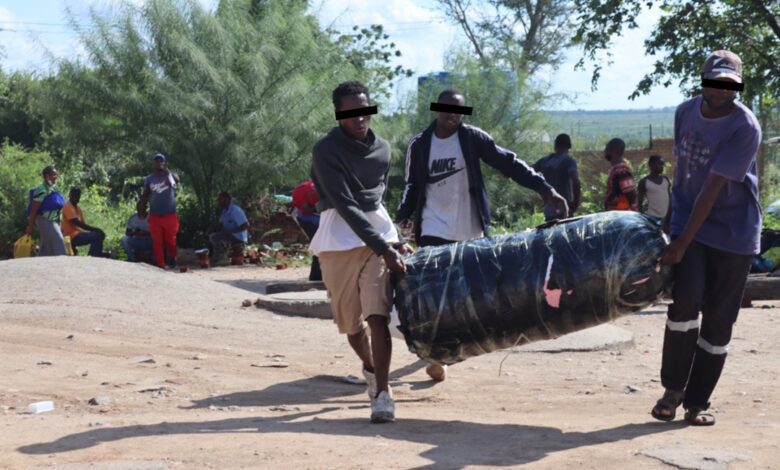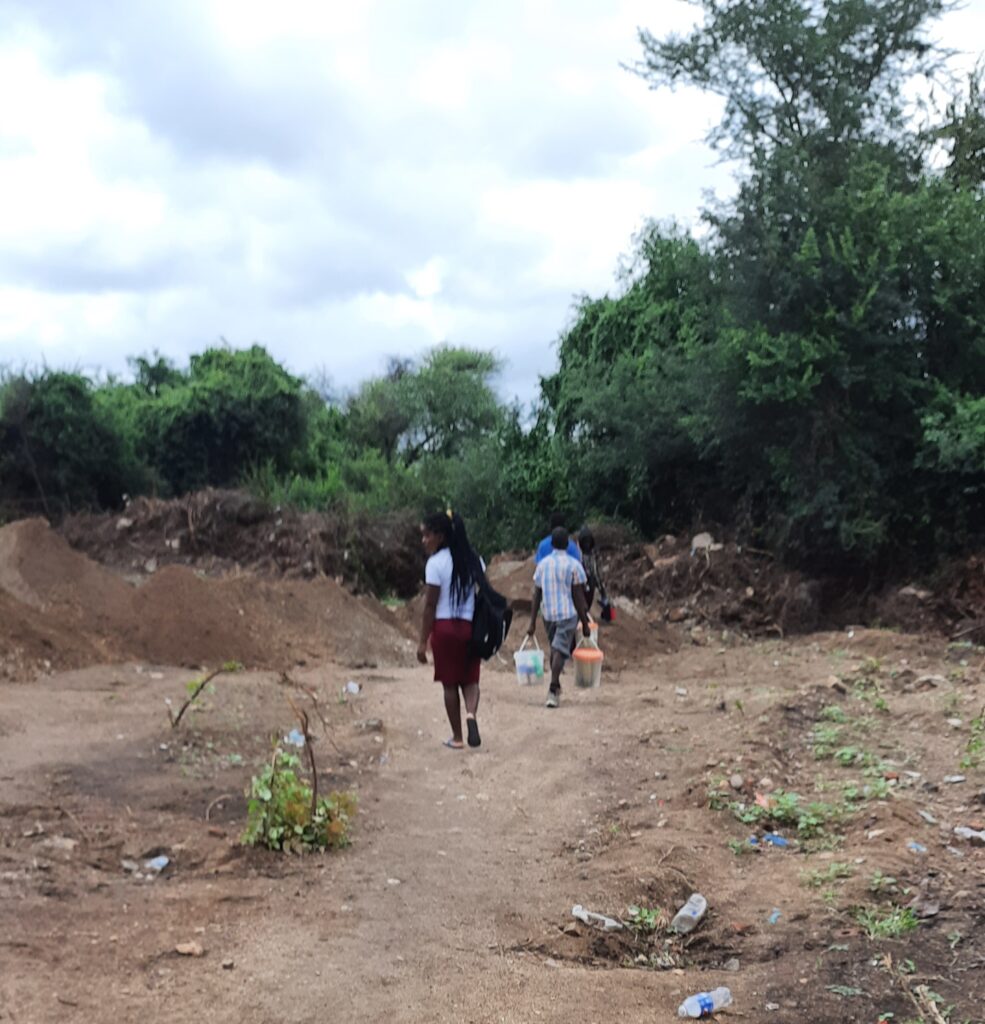The dangerous journey south in search of a better life

Decent Mbedzi (42) sits comfortably on a patch of grass as he furiously drives nails through the wooden boards to make a raft near Dulibadzimu gorge, about 5 km south of the Beitbridge border.
It is 2 pm on a blazing Tuesday in Beitbridge and Mbedzi makes haste to finish his wooden raft before sunset.
Evenings are Mbedzi’s business hours as dozens of goods and border jumpers seek to cross into Beitbridge.
The wooden raft is big enough to carry goods and people across the flooded river.
“I am trying to make another raft because the other one I had was destroyed when we got raided a few days ago. It won’t take me long before it is done and business continues,” Mbedzi said.
“I was lucky that they left my rope. It is expensive and I do not know how I was going to continue with work if they had taken it. “
Mbedzi explains that although he can bribe some security officials manning the gorge, there have been constant changes to the crack team.
“We have some of the security guys who know how to work with us, but some just won’t have it. Sometimes bribes won’t work. You will just have to work in the wee hours of the morning. Our spot is now well known so you have to be discreet and smart in this game,” Mbedzi said.
A rope on each side helps keep the raft from being swept away by the heavy torrents.
Smuggling is rife at this crossing point, with smugglers paying large sums to move contraband across the river into the country in the dead of the night, worsening headaches for Zimbabwean authorities.
The crossing point, near Dulibadzimu gorge, is also popular with the illegal immigrants, risking their lives to move to South Africa as the water levels are lower than downstream Limpopo.
Mbedzi’s raft is used by smugglers to transport contraband from South Africa for sale across the border.
Dulibadzimu gorge near a Zimparks compound is a hive of activity in the wee hours of the morning.

Flickering torches and hushed conversations to avoid detection from security officials manning illegal crossing points along the border.
Despite the increased surveillance, Mbedzi and his friends, infamously known as Magumaguma have continued moving smuggled goods across the border.
Smuggled goods include washing powders, cooking oil, beers, spirits, toiletries, and other home goods.
Home goods like refrigerators, stoves, microwaves and even beds can be moved across the border using the wooden raft.

Authorities have recorded an increase in the smuggling of beers and spirits, as they have found a bigger market in Zimbabwe.
Beer brands like Savannah, Budweiser among other clear beers have found their way onto the Zimbabwean market without being cleared by authorities.
In Beitbridge, beer lovers admit that smuggled beer is cheaper than local brands.
“Most of the beer sold here is smuggled into the country through irregular means. It is cheaper to buy foreign beer than local lagers. This has given incentive for smugglers to continue their trade,” a police officer who spoke on condition of anonymity told CITE.
“There has been an increase in the number of checkpoints along the river, but the trade continues. Sometimes you intercept kombis laden with washing powders, while some carry spirits only. No matter how many times you intercept and impound goods, those involved will find a way,” the policeman said.
The Limpopo runs for about 260km along the border, and the police have just eight bases, 20 miles apart, making it difficult to control.
There are also over 200 illegal crossing points along the Limpopo River, making it nearly impossible for authorities to stem smuggling.
Duilibadzimu gorge is one of 200 illegal crossing points along the Zambezi River, used by smugglers.
Sweat drips on Carlos Mpande, 40, as he tries to salvage a broken boat after a police raid.
His boat was destroyed by members of the army following a raid near Dulibadzimu gorge. Broken into two pieces, Mpande needs a miracle to get back into business.
Before the security officers manning the river destroyed his boat, he had lost three other canoes.
“My children depend on this boat; I have to make it work. Business is growing and my only means of making money has been destroyed,” Mpande said as he gazes into the sky as if to summon divine strength.
“It will take me two days to get this boat working again, which means I would have missed two days of work. But it must work,” Mpande said.
While some choose to move contraband in the dead of the night, others are daring to do so during the day.
The thick bushes that lead to the Limpopo River have become a channel of smuggling goods into the country.
Taxi drivers have also become a conduit for smuggling as they move contraband.
“I charge 100 rands per customer. This is to cater for any eventualities along the way as you know there are soldiers everywhere,” a taxi driver said.
“You can be unlucky sometimes when you meet an unfamiliar security official. They may impound the vehicle or arrest you. It is a dicey game but that is the only way we survive.”
Zimbabwean authorities have been in sixes and sevens as smuggling continues to rise.
Zimbabwe Republic Police (ZRP) spokesperson Paul Nyathi said authorities are conducting weekly arrests.
“We have been arresting smugglers every week. We urge the public to declare their goods at the border and pay their excise duty. They risk being arrested if they use other means,” Nyathi told CITE.
The Covid-19 pandemic worsened smuggling in the country as inland borders remained closed for the public.
Cross border traders who survive on buying and selling goods from South Africa found themselves with no income, hence smuggling became the only source of livelihood.
The smuggling of tobacco also rose during the pandemic.
This triggered South Africa and Zimbabwe to step up border patrols in a bid to stop cigarette smuggling.
Authorities from the two countries, recovered millions worth of cigarettes as smugglers looked poised to make profits from moving contraband.
By February this year South African police had recovered 670 000 Rands worth of cigarettes.
It is estimated that over 40% of cigarette brands sold in South Africa are from Zimbabwe.
Until smugglers find other means to eke a living, they will continue risking their lives along crocodile infested river.





